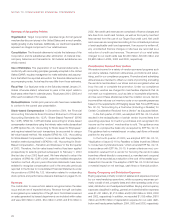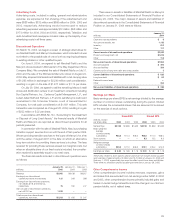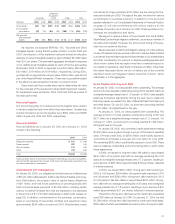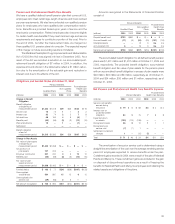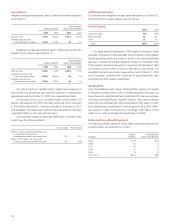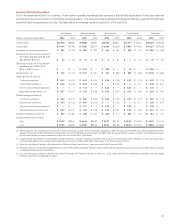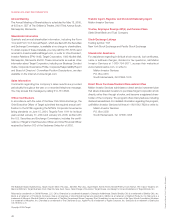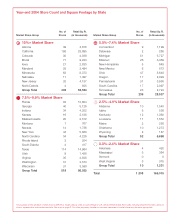Target 2004 Annual Report Download - page 40
Download and view the complete annual report
Please find page 40 of the 2004 Target annual report below. You can navigate through the pages in the report by either clicking on the pages listed below, or by using the keyword search tool below to find specific information within the annual report.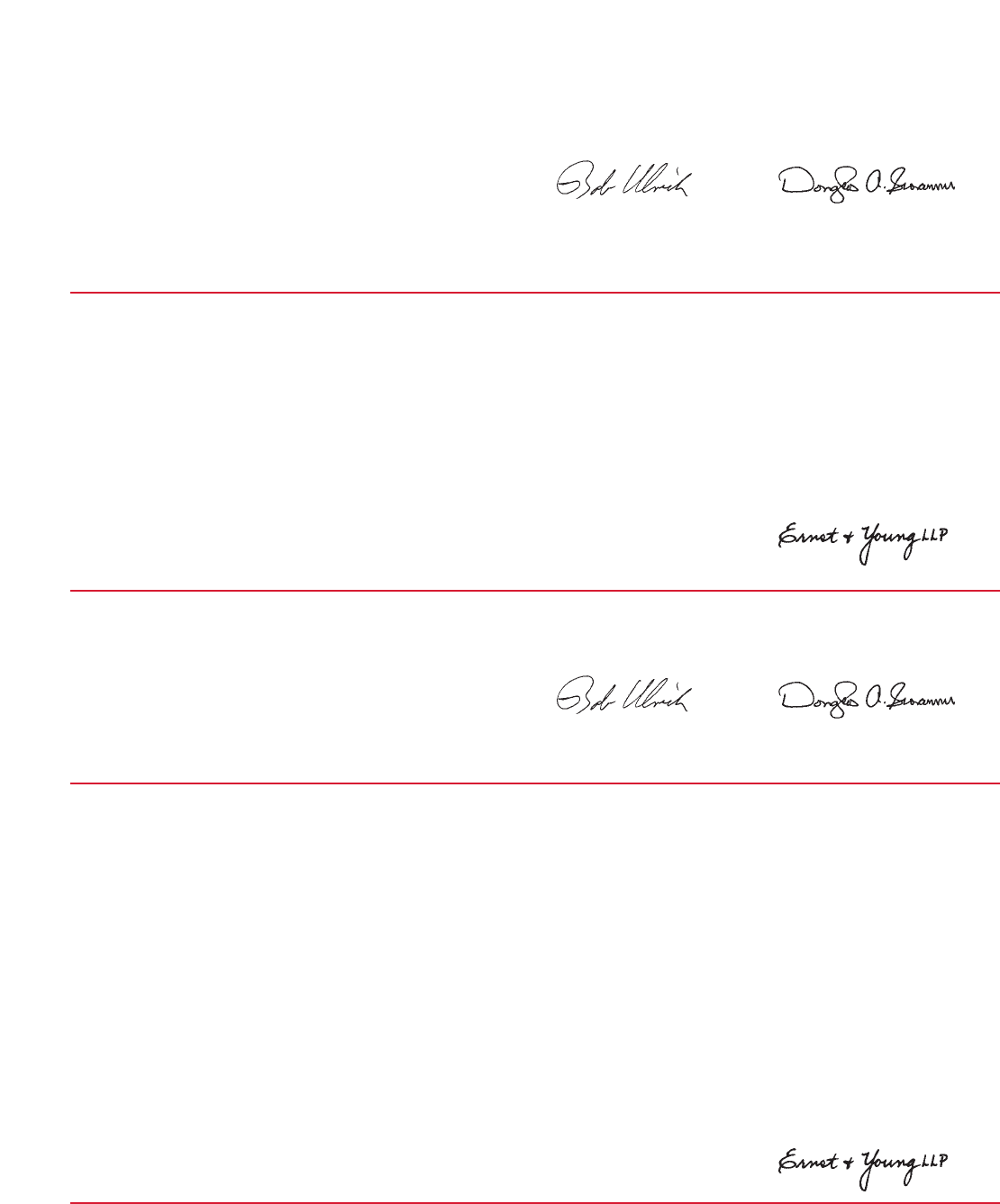
38
Report of Independent Registered Public Accounting Firm
on Consolidated Financial Statements
The Board of Directors and Shareholders
Target Corporation
We have audited the accompanying consolidated statements of financial position of
Target Corporation and subsidiaries as of January 29, 2005, and January 31, 2004, and
the related consolidated results of operations, cash flows and shareholders’ invest-
ment for each of the three years in the period ended January 29, 2005. These financial
statements are the responsibility of the Corporation’s management. Our responsibility
is to express an opinion on these financial statements based on our audits.
We conducted our audits in accordance with the standards of the Public
Company Accounting Oversight Board (PCAOB) (United States). Those standards
require that we plan and perform the audit to obtain reasonable assurance about
whether the financial statements are free of material misstatement. An audit includes
examining, on a test basis, evidence supporting the amounts and disclosures in the
financial statements. An audit also includes assessing the accounting principles used
and significant estimates made by management, as well as evaluating the overall
financial statement presentation. We believe that our audits provide a reasonable
basis for our opinion.
In our opinion, the financial statements referred to above present fairly, in all
material respects, the consolidated financial position of Target Corporation and
subsidiaries at January 29, 2005, and January 31, 2004, and the consolidated results
of their operations and their cash flows for each of the three years in the period ended
January 29, 2005, in conformity with U.S. generally accepted accounting principles.
We also have audited, in accordance with the standards of the PCAOB
(United States), the effectiveness of the Corporation’s internal control over financial
reporting as of January 29, 2005, based on criteria established in Internal Control
– Integrated Framework issued by the Committee of Sponsoring Organizations of
the Treadway Commission, and our report dated March 25, 2005, expressed an
unqualified opinion thereon.
As discussed in the Stock-based Compensation note to the financial state-
ments, effective February 1, 2004, the Corporation adopted Statement of Financial
Accounting Standards No. 123 (revised 2004), “Share-Based Payment” using the
modified retrospective transition method.
Minneapolis, Minnesota
March 25, 2005
Report of Management on Internal Control
Our management is responsible for establishing and maintaining adequate internal
control over financial reporting, as such term is defined in Exchange Act Rules
13a-15(f). Under the supervision and with the participation of our management,
including our chief executive officer and chief financial officer, we assessed the
effectiveness of our internal control over financial reporting as of January 29, 2005
based on the framework in Internal Control – Integrated Framework issued by the
Committee of Sponsoring Organizations of the Treadway Commission. Based on
our assessment we conclude that the Corporation’s internal control over financial
reporting is effective based on those criteria.
Our management’s assessment of the effectiveness of our internal control over
financial reporting as of January 29, 2005 has been audited by Ernst & Young LLP,
an independent registered public accounting firm, as stated in their report which is
included herein.
Robert J. Ulrich Douglas A. Scovanner
Chairman of the Board and Executive Vice President and
Chief Executive Officer Chief Financial Officer
March 25, 2005
Report of Audit Committee
The Audit Committee met six times during fiscal 2004 to review the overall audit
scope, plans for internal and independent audits, the Corporation’s systems of internal
control, emerging accounting issues, audit fees and benefit plans. The Committee
also met individually with the independent auditors, without management present,
to discuss the results of their audits. The Committee encourages the internal and
independent auditors to communicate closely with the Committee.
The Audit Committee reviewed and approved the Corporation’s annual financial
statements and recommended to the full Board of Directors that they be included in
the Annual Report. The Audit Committee also recommended to the Board of
Directors that the independent auditors be reappointed for fiscal 2005, subject to
the approval of the shareholders at the annual meeting.
March 25, 2005
Report of Independent Registered Public Accounting Firm
on Internal Control over Financial Reporting
The Board of Directors and Shareholders
Target Corporation
We have audited management’s assessment, included in the accompanying Report
of Management on Internal Control, that Target Corporation and subsidiaries main-
tained effective internal control over financial reporting as of January 29, 2005, based
on criteria established in Internal Control – Integrated Framework issued by the
Committee of Sponsoring Organizations of the Treadway Commission (the COSO
criteria). The Corporation’s management is responsible for maintaining effective internal
control over financial reporting and for its assessment of the effectiveness of internal
control over financial reporting. Our responsibility is to express an opinion on
management’s assessment and an opinion on the effectiveness of the Corporation’s
internal control over financial reporting based on our audit.
We conducted our audit in accordance with the standards of the Public
Company Accounting Oversight Board (PCAOB) (United States). Those standards
require that we plan and perform the audit to obtain reasonable assurance about
whether effective internal control over financial reporting was maintained in all material
respects. Our audit included obtaining an understanding of internal control over
financial reporting, evaluating management’s assessment, testing and evaluating
the design and operating effectiveness of internal control, and performing such other
procedures as we considered necessary in the circumstances. We believe that our
audit provides a reasonable basis for our opinion.
A company’s internal control over financial reporting is a process designed to
provide reasonable assurance regarding the reliability of financial reporting and the
preparation of financial statements for external purposes in accordance with generally
accepted accounting principles. A company’s internal control over financial reporting
includes those policies and procedures that (1) pertain to the maintenance of records
that, in reasonable detail, accurately and fairly reflect the transactions and dispositions
of the assets of the company; (2) provide reasonable assurance that transactions are
recorded as necessary to permit preparation of financial statements in accordance
with generally accepted accounting principles, and that receipts and expenditures of
the company are being made only in accordance with authorizations of manage-
ment and directors of the company; and (3) provide reasonable assurance regarding
prevention or timely detection of unauthorized acquisition, use, or disposition of the
company’s assets that could have a material effect on the financial statements.
Because of its inherent limitations, internal control over financial reporting may
not prevent or detect misstatements. Also, projections of any evaluation of effective-
ness to future periods are subject to the risk that controls may become inadequate
because of changes in conditions, or that the degree of compliance with the policies
or procedures may deteriorate.
In our opinion, management’s assessment that Target Corporation and subsidi-
aries maintained effective internal control over financial reporting as of January 29,
2005, is fairly stated, in all material respects, based on the COSO criteria. Also, in our
opinion, the Corporation maintained, in all material respects, effective internal control
over financial reporting as of January 29, 2005, based on the COSO criteria.
We also have audited, in accordance with the standards of the PCAOB
(United States), the consolidated statements of financial position of Target Corporation
and subsidiaries as of January 29, 2005, and January 31, 2004, and the related
consolidated results of operations, cash flows, and shareholders’ investment for
each of the three years in the period ended January 29, 2005, of Target Corporation
and subsidiaries, and our report dated March 25, 2005, expressed an unqualified
opinion thereon.
Minneapolis, Minnesota
March 25, 2005
Report of Management on the Financial Statements
Management is responsible for the consistency, integrity and presentation of the
information in the Annual Report. The consolidated financial statements and other
information presented in this Annual Report have been prepared in accordance with
accounting principles generally accepted in the United States and include necessary
judgments and estimates by management.
To fulfill our responsibility, we maintain comprehensive systems of internal
control designed to provide reasonable assurance that assets are safeguarded and
transactions are executed in accordance with established procedures. The concept
of reasonable assurance is based upon recognition that the cost of the controls
should not exceed the benefit derived. We believe our systems of internal control
provide this reasonable assurance.
The Board of Directors exercised its oversight role with respect to the
Corporation’s systems of internal control primarily through its Audit Committee,
which is comprised of four independent directors. The Committee oversees the
Corporation’s systems of internal control, accounting practices, financial reporting and
audits to assess whether their quality, integrity and objectivity are sufficient to protect
shareholders’ investments. The Committee’s report appears on this page.
In addition, our consolidated financial statements have been audited by Ernst
& Young LLP, independent registered public accounting firm, whose report also
appears on this page.
Robert J. Ulrich Douglas A. Scovanner
Chairman of the Board and Executive Vice President and
Chief Executive Officer Chief Financial Officer
March 25, 2005


